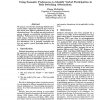4650 search results - page 46 / 930 » Generating and evaluating evaluative arguments |
PLDI
1996
ACM
14 years 29 days ago
1996
ACM
Two key steps in the compilation of strict functional languages are the conversion of higher-order functions to data structures (closures) and the transformation to tail-recursive...
Publication
This paper describes the structure of, and the ideas behind, a self-applicable specializer of programs, as well as the principles of operation of a compiler generator that has been...
ITS
2010
Springer
14 years 24 days ago
2010
Springer
The ability to argue is essential in many aspects of life, but traditional face-to-face tutoring approaches do not scale up well. A solution for this dilemma may be computer-suppor...
ANLP
2000
13 years 10 months ago
2000
We propose a method for identifying diathesis alternations where a particular argument type is seen in slots which have different grammatical roles in the alternating forms. The m...
EACL
2006
ACL Anthology
13 years 10 months ago
2006
ACL Anthology
We consider the evaluation problem in Natural Language Generation (NLG) and present results for evaluating several NLG systems with similar functionality, including a knowledge-ba...

